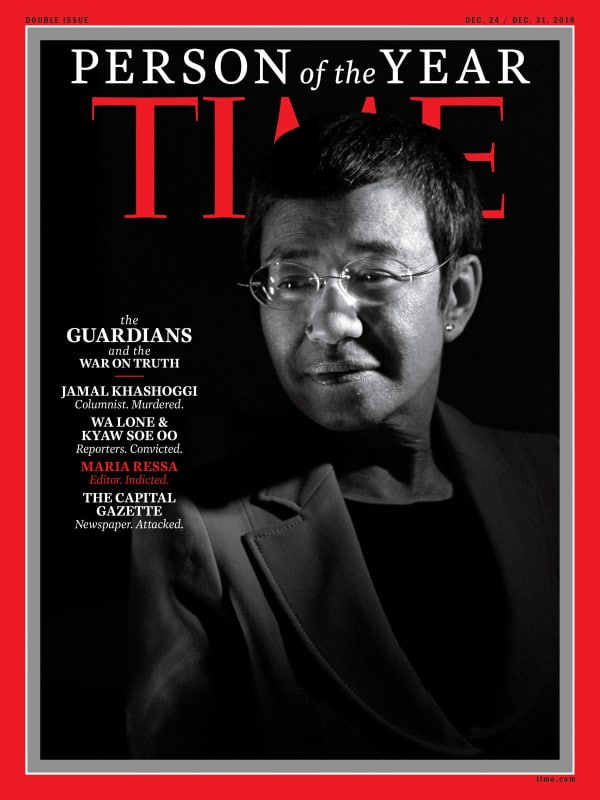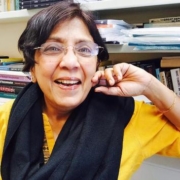Maria Ressa
Fighting against Propaganda in the Philippines
 The past few shows have focused on climate change as being the biggest issue facing teacher unions globally. There are, of course, other big issues. One of them is propaganda. Misinformation campaigns have been on the rise partly due to the turn towards right-wing extremism in many parts of the world. Social media has created new ways to spread misinformation and propaganda, making education a powerful tool to combat the spread of lies and what we might call fake news.
The past few shows have focused on climate change as being the biggest issue facing teacher unions globally. There are, of course, other big issues. One of them is propaganda. Misinformation campaigns have been on the rise partly due to the turn towards right-wing extremism in many parts of the world. Social media has created new ways to spread misinformation and propaganda, making education a powerful tool to combat the spread of lies and what we might call fake news.
My guest today is Maria Ressa, a Filipino-American journalist and author. Co-founder of online news site Rappler, she has been an investigative reporter in Southeast Asia for CNN and was included in the 2018 Time’s Person of the Year for her work combating fake news. She has been arrested for her reporting on Duterte, the Philippine president, and is currently on trial for cyber libel.
Citation: Ressa, Maria, interview with Will Brehm, FreshEd, 172, podcast audio, September 16, 2019. https://freshedpodcast.com/mariaressa/
Will Brehm 1:59
Maria Ressa, welcome to FreshEd.
Maria Ressa 2:01
Thanks for having me.
Will Brehm 2:02
So as a journalist, how does it feel to be the news today, rather than reporting it?
Maria Ressa 2:09
Extremely uncomfortable, but at the same time, I know that this is a completely different time. And all of our old definitions have to get trashed. And we are creating what our new world is going to look like, not just of journalism, but of democracy, of information, which is the critical part of democracy. I think it’s an existential crisis that we’re in right now. And I say this all the time: when journalists are under attack, we’re the front lines on that battle for facts. And when journalists are under attack, democracy is under attack. So how does it feel to be? I don’t like it. At the same time, I see so much because of where I am right now. The fact that I’m a reporter who used to follow terrorist networks. We took that same kind of rigor to look at social networks and social media. And then the business model of Rappler was turning what … my last book is called ‘From Bin Laden to Facebook,’ and I was looking at how the ideology of terrorism spreads through social networks, right? What’s social media? It’s your family and friends. It’s your social networks without boundaries of time or space. But so, we took that, and then the ideas behind Rappler is really: If the bad guys can use this to spread evil, why can’t the good guys? And so, when I was building Rappler and talking to my elevator pitch for investor, one sentence, “We build communities of action.” And the food that we feed the communities is journalism. So, it’s journalism – your Venn diagram – journalism, technology, community. And that’s what made Rappler different. There were four or five of us above 40 when we started it, and then I knew enough to know I didn’t know enough. We needed digital natives to tell us what the new world is going to look like. So, then we hired the smartest 20somethings we could find. It started with 12 people. In a year and a half, we grew to 75 and became the third top online news site in the Philippines. We were able to fight the giants, one of which I used to manage – and I know how much they spent, right? – with a fraction of the cost. And I think that right there you can see right what happened in … well it did Uber. You know, the disruption in each of these businesses ultimately became a disruption in information; a disruption in governance; a disruption in global geopolitical power; and that’s what we’re living through right now.
Will Brehm 4:53
And you are experiencing it, I mean firsthand, like no one else in the world is probably experiencing it.
Maria Ressa 4:58
That’s why it’s so much fun at the same time that it’s so so so alarming. We raised the red flags early; we had data by July of 2016, which was, not coincidentally, the start of this brutal drug war in the Philippines. The way social media had been weaponized, we saw it in the data. And we gave that to Facebook. Because I run the business, I could see how the advertising model is dead and how, ironically, the same social media platforms that are being used to attack the credibility of journalists, that are used to attack personally in very visceral ways – women journalists, right. How that same platform is also gutting the business model. That 85 to 90% of the advertising new digital ad spend is going to the tech giants. So, it’s a perfect storm of a lot of things. But you know, I first looked at it as somebody who was running a news group who wants journalism to succeed. And then, by doing our work as reporters, we found the disinformation networks and realized how insidious these information operations are that governments are using a scorched earth policy against their own citizens. Their target is to manipulate their citizens for short term gain, and this coincides with the kind of spread of populism turned authoritarianism turned movement towards dictatorship that we are seeing globally.
Will Brehm 6:37
But not just in the Philippines, but in so many other places. I mean in European countries, in American … North American countries.
Maria Ressa 6:43
Absolutely. And the studies are out, right. As early as November 2017, Freedom House came out with a study that said in at least 28 countries around the world, cheap armies on social media was rolling back democracy. In 2018, Oxford University’s Computational Propaganda Research project added 48 countries. And we keep looking at this. But the irony, of course, is that you can’t tell it because if each of our feeds are individualized, are personalized, then I don’t see your attacks or how wonderful your feed may be, I see mine. And so, in a way, for reporters under attack, it’s like a silent scream. And I had to struggle with that when I started getting 90 hate messages per hour.
Will Brehm 7:33
Oh, my God.
Maria Ressa 7:35
That was after we finished our first propaganda series, I wrote two of the three parts of that.
Will Brehm 7:41
Is that when you knew something was terribly wrong?
Maria Ressa 7:44
I knew it was wrong because the data showed it to me. When we became the target, I half expected it but didn’t know what it would be really like until I was there. And here’s the part, that’s also part of a much bigger thing, this kind of exponential lies. So, they astroturf it, fake, right? So, they astroturf it, creating a bandwagon effect, right. That is like the fertilizer before real power. Our government then comes top down. So, this is bottom-up; astroturf, cede the ground. And then the government will come down and say the exact same thing. Its truth. In our case, the weaponization of social media, their main message was foreign-owned Maria is not a Filipino. And then everything; I’ve been called every animal. I’ve been called every sexist or misogynistic remark. Actually, they’re pretty garbagey. I mean, it’s all crap, right? And then the same attack then came out of President Duterte’s mouth a year and a half later at his State of the Nation address: that Rappler is 100% owned by Americans actually is what he said. Which isn’t true.
Will Brehm 9:04
But it made it from this social media world of “fake news,” as we might call it, to the President of the Philippines.
Maria Ressa 9:12
So, what we called this … in August of 2017, we were working with 12 other researchers from around the world to look at this, and the term that was coined by our head researcher then is “patriotic trolling”. Camille Francois. Patriotic trolling is online, state-sponsored hate that is meant to pound you to silence, and it targets but perceived critics. Because at that point, I wouldn’t have called Rappler a critic. What we were doing is calling a spade a spade. But, as I had first-hand experience of how power is abused, I call a spade a spade, and I suppose given the fear that’s happening, where people don’t call it and where I am because I feel it personally, I see it personally. I get arrested and denied bail because they just want me to feel their power. So, I acknowledge that, but then I call them out. You abused your power. And I will, as long as my constitutional rights are there, are guaranteed, then I will continue doing that.
Will Brehm 10:19
How, in the Philippine society, in the space where you’re writing and reporting, how can you create a space where there can be facts that we might all agree on but different interpretation of those facts? Different perspectives on those facts? Because that’s not fake news, in a way. There’s a slight difference between the making something “unfactual” presented as a fact and a different way of understanding a fact.
Maria Ressa 10:56
One man’s terrorist is another man’s freedom fighter. Glass half empty, half full. This is valid, right? That can happen when algorithms are not pushing you to extremist views and creating echo chambers. Some academics will say echo chambers don’t exist. I know firsthand. I watched this created in the Philippines. I watched the rift pounded and half lies laced with anger and hate really create a chasm. And then the echo chambers are there. How do we correct it? Right now, the social media platforms. So, number one is: we have to design tech for democracy, right. I’m part of several international groups trying to figure this out. There’s a design for democracy coalition, largely based … I mean, the founders were in the States, but it looks at what’s happening in other parts of the world. I’m part of the Information and Democracy Commission, 28 of us, sorry, 25 of us from 18 different countries. This is an initiative by … the co-chairs are Nobel laureate Shirin Ebadi, the Iranian Nobel laureate, and then RSF’s (Reporters Without Borders), the Secretary-General there, and so many more. The idea there is that the solution can’t be done by one, because governments and old power, that’s the last part, which I think is a good first step. And we just published this yesterday, July 10 and 11th, Britain and Canada finally pulled governments together to defend media freedom to say that when human rights violations happen, that they shouldn’t stay silent, that there should be a quick reaction team that will go. Like when Canada … Chrystia Freeland, a former journalist, tweeted in support of a blogger in Saudi Arabia, right. And then Saudi Arabia pushed back, and no one helped. Not one nation. You would have expected the US in the past would have done that, but not one nation came in. How can we not be clear about our values?
Will Brehm 13:11
There’s certainly a problem of state power when it comes to propaganda and misinformation. But it also seems like, since you’re talking about algorithms in social media, that there is an equal challenge of the concentration of power in particular companies that own the spaces of social media, like Twitter or like Facebook.
Maria Ressa 13:33
Right now, they are more powerful than governments. And let me explain that statement. I think that never before in the world has one company, Facebook … If you put together Facebook and WhatsApp, they pull together 2.7 billion accounts. Never before have these kind of verticals per country … Because before media was only for each country, and then maybe you would have like a CNN, or something that would cut across. Well, now this cuts across, right, and when the lie pops up in one country, like Hungary against George Soros, it pops up everywhere, and the networks actually work together. The Alt-Right in Europe are working with the Alt-Right in Canada are working with the Alt-Right in the United States. I mean, very interesting stuff. And the connections between those and Russian disinformation in the Philippines right now. We’re just starting to look at what China is doing. Because, again, in the past, right, China and Russia had very different approaches. So, this is the old-world way of looking at the world. China would censor, and then they began doing social media accounts as of 2016 (this is Wall Street Journal’s number). They were pumping out 450 million social media messages, but they were like really boring, like the great leader type boring stuff. Russia, on the other hand, was pounding the fracture lines of society and was crippling institutions. So, if you don’t know what to believe, if you can’t agree that this is a microphone. You know, someone can just say, “This is a pin”. No, it’s microphone, it’s a microphone. And then somebody says a million times, “This is a pin”, that’s what becomes …
Will Brehm 15:26
…true. I mean, it really is about truth.
Maria Ressa 15:28
That’s the environment that we live in now, right? I think, if anything, more than at any other time, I’ve always known information is power. Information is power. And states used to have that power. But now, they’re not the ones in charge of this. And this is part of the reason like when we think about solutions to this world: short, medium, long term. Long term is education. Medium term is media literacy. But in the short term, you can’t even rely on legislation, because we look at how … like watching the congressional hearings with Mark Zuckerberg, as like, “Oh, my God”.
Will Brehm 16:03
Yes, because it’s these old white men … they don’t know anything about Facebook and Twitter.
Maria Ressa 16:08
They’re not on social media.
Will Brehm 16:10
And they’re the ones asking questions and trying to regulate this massive industry. It’s sort of farcical when I watch it.
Maria Ressa 16:18
So, I will say Canada and Britain are a little bit better. I testified in one of the hearings that they had, and I was surprised by the complexity of the questions. And they had reading that they made everyone … I mean, it’s 14 nations and the MPs of 14 nations now. But back to the short term. In the short term, the only people who can act to make things better right now are the social media platforms. And that’s all in their power. So, I’m a partner of Facebook; Rappler’s a partner of Facebook, Twitter, YouTube, Google. And what we can see is, we’re one of three fact-checking partners in the Philippines. When we find a lie, we then look at the network that spreads the lies. And that’s more interesting.
Will Brehm 17:09
So, what do you find?
Maria Ressa 17:11
Repeat. Then I treat them like terrorist networks. Repeat. You kind of like … have your Interpol watch list, and then you have the terrorists. And then this is … Facebook has done takedowns already. So, what’s so interesting about this is until the world figures out how to deal with this, when you talk about creative destruction. And again, like the robber barons, then began to do something about what they … that they took advantage of people in this. And then they went ahead and funded all of the education that needed to happen, and they made up for it. Right? Well, right now, the only groups that can act are the tech people. And so, how do we get that? They keep saying, “Tell us what to do”. Yeah, okay. Even something like content moderation. The kinds of prescriptive … They’ve atomized meaning to meaninglessness, right?
Will Brehm 18:09
What do you mean?
Maria Ressa 18:10
So, in the past, the value of a news piece is in its insight in what it would give. The value of a news group is the value of the brand that’s built over decades of great investigative reporting. Now, the value of a piece is page views. And it’s not about meaning, it’s about page views.
Will Brehm 18:32
“Clickbait,” or whatever they call it.
Maria Ressa 18:33
And clickbait does not reward thinking slow. It rewards thinking fast. Daniel Kahneman’s book on the two systems of thinking for a human being, which means we moved away from even the way of rewarding money before rewarding advertising, before a new school would build its credibility. And it would be based on this. You can charge based on that. Now it’s based on clicks. On something that is “tech.” And again, you go back to this entire system that was created by people who atomized the world. Who says that that’s the best way of doing it, right? And how can you say that this one story is not worth 800 of these clickbait stories, right? How can only the tech guys got to do that? And for me, I say “atomizing meaning,” because, in the end, these clicks are meaningless unless … I think that’s what journalists do. That’s what educators do. We look for meaning, we look for a purpose, and brand is built that way. Speaking as a founder. How can you reward courage, for example? You don’t. Not in this system. And sorry, the last thing on content moderation: Why don’t they use – instead of making it up themselves and making it so that they can make the most money, or make it the easiest for content moderators – why not include users of backbone? This is David Kay, the UN special rapporteur on freedom of expression suggested using the UN Declaration of Human Rights.
Will Brehm 20:11
Interesting.
Maria Ressa 20:12
That’s interesting to me because there’s at least some standards and ethics. That’s what’s been missing in the way tech built this exponentially virulent world.
Will Brehm 20:24
Right, and it just keeps growing and growing and growing till it’s all gone. Destroys it all.
Maria Ressa 20:26
They’ve rewarded crap.
Will Brehm 20:30
Created destruction again.
Maria Ressa 20:32
But impunity, right? The people who figure it out.
Will Brehm 20:35
Like billions, actually, impunity plus a lot of money.
Maria Ressa 20:39
I think last year, $40 billion for Facebook.
Will Brehm 20:43
One of the things that really fascinates me is … so you’re from the Philippines. You’re experiencing terrible oppression from the state itself. And when you look around Southeast Asia, this is not that uncommon, right? You look at Hun Sen in Cambodia, or where in Thailand now, just a couple of what? A year ago? They changed to a civilian government after many years of military rule because a progressive leader was elected by the rural poor in Thailand, or you look at Myanmar or Burma, where the Rohingya have been persecuted because of social media in many ways, but through social media as well.
Maria Ressa 21:25
By the military.
Will Brehm 21:26
By the military, right. And Aung San Suu Kyi had so much hope in sort of the liberal world, and then she has shifted over. So, this “illiberalism” in Southeast Asia, it makes me wonder why. Why, in this part of the world where we’re sitting today, are middle classes being the most illiberal groups of people in these societies? How did that come about? Why is Southeast Asia unique, in a way, in this sense?
Maria Ressa 21:54
Well, I think … I’ll boil it to two reasons. One is: Southeast Asia was never at the forefront of democracy, to begin with. The Association of Southeast Asian Nations; it was there when it … It included Laos, Myanmar, and Cambodia, and Hun Sen was already the leader. That was, like, in the 80s. 87? We are countries that have the cultural barometer, the high-Power Distance Index. The Power Distance Index is the ability of someone to challenge a leader, to challenge somebody with power in the system. And in our countries, it’s very … like in Indonesia, orang kecil – the little people. In the Philippines mass base, mass base, little people as well. They’re different phases: the idea that they’re still enjoying Suharto’s days, Pakubuwono, the nail that holds the universe in place. That they’re that Suharto was actually unquestion able, right? Same in Cambodia, with Hun Sen, right. So, these are countries with this high-Power Distance Indexes in our culture … I took over the largest news group in the Philippines. And I was like, “you gotta tell me what you really think”. And it was really hard to get people to tell you what they really think if you’re the boss, right? It’s more Western. So, I think there’s that, where people want … And this is part of the reason why this movement towards more populist authoritarian style leaders is easy and easier in our countries. They want someone to tell them what to do. It’s feudalism, right? Patronage-driven feudalism in so many ways. So, there’s that foundation. But then the other part of it is Facebook has taken a huge toll in our countries, because you already have governments that have power, and unfortunately now have used social media in ways to gain more power in a scorched earth policy. We’ve seen this in Myanmar, and that’s been called out globally, and now the UN is acting on it. Same thing is happening in the Philippines, where this brutal drug war seeds a climate of fear, and you’re talking – according to the UN, their estimates say from July 2016 until December last year – at least 27,000 people killed. The Philippine police admitted to 6,600. This is like much more than were killed in the 21 years of the Marcos rule, right. So, there’s the climate of fear in the real world. And the climate of fear in the virtual world. There is the inciting to hate, inciting against elites, shaming – smart shaming. There’s also, in the case of Myanmar, a jump from 3% internet penetration to 72% internet penetration when they came in. And no sense that your lie on social media is actually a lie. There is not that … There wasn’t any unique literacy because it came from a censor device.
Will Brehm 25:12
And it came really quickly, right? Once the cell phone became cheap, and everyone had them and all of a sudden everyone’s on Facebook on their cell phones.
Maria Ressa 25:18
Because it was it was free Facebook, right? It was free basics put in the country. Same in the Philippines. Same in Indonesia. I think our countries didn’t have the sophistication, but at the same time, we embraced … I embrace Facebook, because I was like, “Okay, well, if you could give me a better way of doing it than the old way, can we build institutions bottom up?” Not knowing that … you know, that was 2012, and we did do that. I saw it, and it happened with Rappler. We built communities of action, for disasters, for climate change. And, because we have an average of 20 typhoons every year, and we had … we were able to, at different times, send 70,000 volunteers to the Department of Social Welfare and Development when a typhoon strikes. We were able to build a platform where people can see who needs help and create a system of hashtags. If you need help, hashtag “rescuePH” (#rescuePH), right? So, who would have thought from that in 2013 to the patriotic trolling of 2016? That’s only three years. The three-year gap!
Will Brehm 26:23
I know. I mean, it moves so quickly. One of the things I’ve been following lately is, in Cambodia, for instance, Hun Sen is creating these sort of … institutes to combat fake news. And so, he’s sort of using some of these ideas of disinformation, and changing them, so it furthers his own power. It sort of just blows your mind how quick the state is able to adapt to these new ideas and issues that you’re fighting for, but then using it to literally undermine your very goal.
Maria Ressa 26:58
Hun Sen is interesting because … there is a dictator’s playbook. They do get together. They talk to each other. They like each other. Right? Duterte likes, and I’m going to include Trump. Duterte likes Putin. In APEC, right? Duterte likes Trump. I’ve watched them both. I was in Vietnam during the APEC meeting … summit a few years ago, and then during the ASEAN meeting, but I think Cambodia is much much clearer.
Will Brehm 27:27
Yeah, sort of pure.
Maria Ressa 27:29
Go to something like Singapore and the fake news slot there. And look at the way the West looks at Singapore versus the way Southeast Asia looks at Singapore. And I’ll say I’m conflicted because I’ve covered Singapore for CNN, starting with the caning of Michael Fay. Starting when Goh Chok Tong took over. I mean, I literally I began my career in 1986 with people power in the Philippines. And through my career, I watched and was reporting on how every single country in Southeast Asia – my part of Southeast Asia didn’t include Cambodia because Hun Sen’s been there forever – and Brunei. They move from authoritarian one-man rule to democracy. You know, 1998, the fall of Suharto. I did the first interview with Habibie coming out. So, it was an incredible time, and I would hate to see the pendulum begin to swing back. And that’s what we’re seeing. And the accelerant is social media.
Will Brehm 28:33
Well, Maria Ressa, thank you so much for coming and talking and joining me with FreshEd. Thank you so much.
Maria Ressa 28:39
Thanks for having me.
Coming soon!
Coming Soon!









